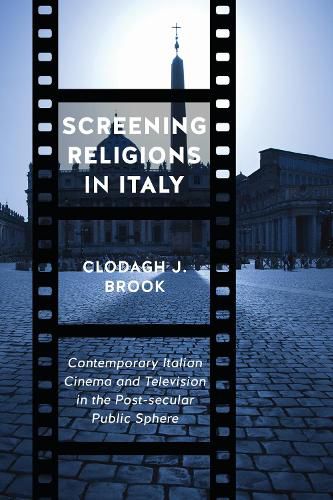Readings Newsletter
Become a Readings Member to make your shopping experience even easier.
Sign in or sign up for free!
You’re not far away from qualifying for FREE standard shipping within Australia
You’ve qualified for FREE standard shipping within Australia
The cart is loading…






Religion has had been foundational in shaping Italy. Home to the Vatican State, the Italian peninsula is the religious centre for one billion Catholics globally. It is also increasingly home to those of other faiths, especially Islam. Italy’s development as a contemporary post-secular and multi-religious society is fraught and fascinating.
The recent resurgence of religious discourse is a sign of what German philosopher, Jurgen Habermas, has defined as the post-secular condition. Habermas and others have questioned what most people in the West had, up to a few years ago, taken for granted: the unstoppable forward march of secularization and the subsequent marginalization of religion. Instead, one of the greatest global fault-lines in the contemporary world - the divide between absolutist, extremist Islamic faith and liberal, but Christian-inflected, secular values - has religious identity at its core. The first book-length study to examine religion in contemporary Italian cinema and television, Screening Religions in Italy spans genres such as horror, comedy, hagiopics, and TV fiction, and explores both commercial and art-house filmmaking. In a discussion of films and television series that range from Moretti’s Habemus Papam, the author identifies two key issues: how Italian filmmaking constructs the continuing position of religion in the public sphere and why religion persists on Italian screens.
$9.00 standard shipping within Australia
FREE standard shipping within Australia for orders over $100.00
Express & International shipping calculated at checkout
Religion has had been foundational in shaping Italy. Home to the Vatican State, the Italian peninsula is the religious centre for one billion Catholics globally. It is also increasingly home to those of other faiths, especially Islam. Italy’s development as a contemporary post-secular and multi-religious society is fraught and fascinating.
The recent resurgence of religious discourse is a sign of what German philosopher, Jurgen Habermas, has defined as the post-secular condition. Habermas and others have questioned what most people in the West had, up to a few years ago, taken for granted: the unstoppable forward march of secularization and the subsequent marginalization of religion. Instead, one of the greatest global fault-lines in the contemporary world - the divide between absolutist, extremist Islamic faith and liberal, but Christian-inflected, secular values - has religious identity at its core. The first book-length study to examine religion in contemporary Italian cinema and television, Screening Religions in Italy spans genres such as horror, comedy, hagiopics, and TV fiction, and explores both commercial and art-house filmmaking. In a discussion of films and television series that range from Moretti’s Habemus Papam, the author identifies two key issues: how Italian filmmaking constructs the continuing position of religion in the public sphere and why religion persists on Italian screens.